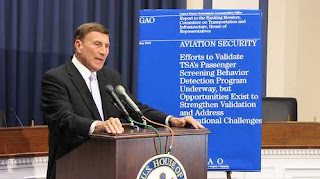 John L. Mica TSA's SPOT Program | Washington, DC – Emergency legislation to ensure that funds remain available to the Coast Guard to respond to the Gulf oil spill was considered in the House today. |
Without this legislation, if the dwindling oil spill emergency fund is depleted, the Coast Guard will be forced to choose between maintaining its oil spill response activities in the Gulf of Mexico and cutting other activities such as search and rescue or drug law enforcement in other parts of the country. During the floor debate, Members of Congress were informed that BP would be paying its past-due account by the end of next week. As of yesterday, BP had failed to pay $69 million in oil spill cleanup costs billed to date by the government.
Mica said he would only agree with providing access to additional funds from the trust account with the assurance that BP and other parties would be held responsible for repayment.
A similar bill, H.R. 5499, was introduced in the House by Mica and other Members of Congress. The Transportation and Infrastructure Committee has jurisdiction over the Coast Guard, the Oil Pollution Act and the Oil Spill Liability Trust Fund (OSLTF).
Mica added, “Congress must also act to ensure the Coast Guard has adequate access to existing Trust Fund resources. Providing this authority will allow the Coast Guard to maintain its response actions and prevent the service from scaling back any of its operations.
“Earlier this year, the Administration proposed cutting the Coast Guard’s budget in the upcoming fiscal year. If this legislation is not enacted, the service will be forced to do more with even less in the current fiscal year,” Mica said.
The OSLTF is funded by a tax on the oil industry and currently has a balance of approximately $1.6 billion. The bulk of the OSLTF is used to pay claims, fund federal agencies to administer the Oil Pollution Act, and support research and development.
Within the OSLTF is the Emergency Fund, which can be used to pay for federal oil spill response costs without waiting for responsible parties to repay the fund. Current law limits the transfer of funds to the Emergency Fund to $150 million per year.
However, the Emergency Fund is diminishing. Because of the provisions of the current law, even as BP reimburses the OSLTF for the federal response costs, these additional reimbursements still will not be available to the federal emergency fund. The Office of Management and Budget has requested this emergency action in today’s legislation.
Both the Senate and House measures will allow the further transfer of funds, in addition to the $150 million annual transfer that has already taken place this year, from the OSLTF to the Emergency Fund. The bill would authorize the Coast Guard to access the fund on an as-needed basis, provided that each transfer was $100 million or less and that justification was provided to Congress. All funding used under this provision would be eligible for reimbursement by BP and would be at no cost to the taxpayers.
Without the authority provided in this bill, the Coast Guard will be required to cut back their operations once the emergency fund limit is reached. # # #
une 10, 2010 House Transportation and Infrastructure Committee 2163 Rayburn House Office Building Washington, D.C. 20515 Phone: (202) 225-9446 Fax: (202) 225-6782








No comments:
Post a Comment